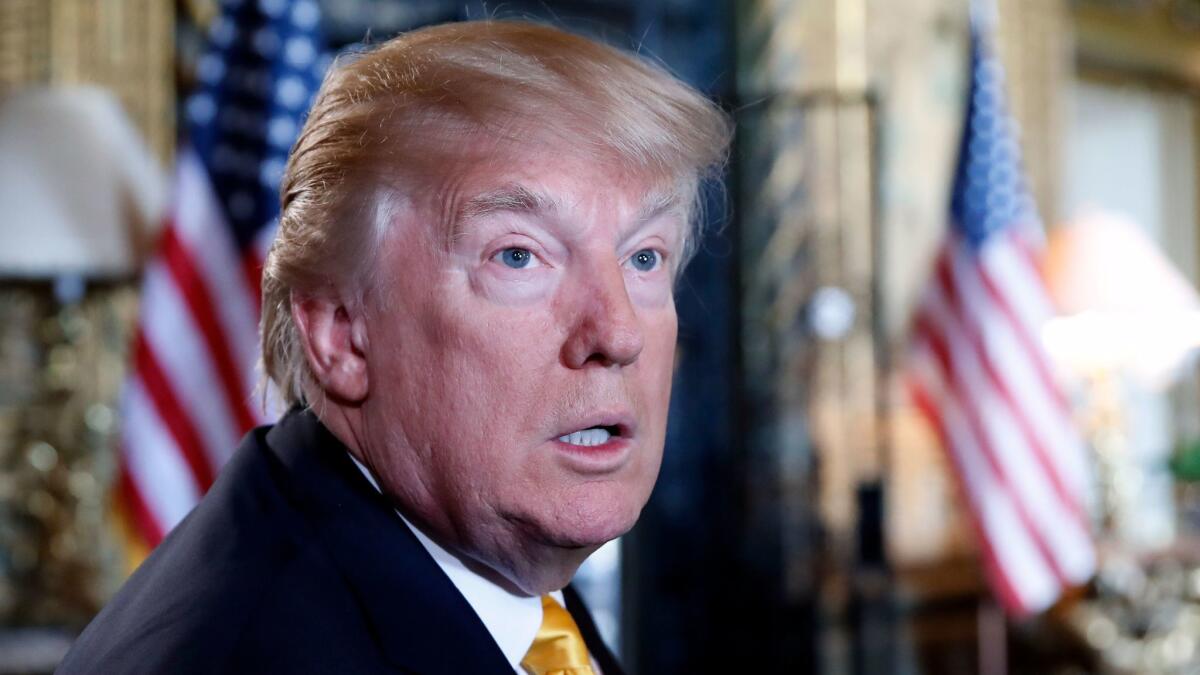Editorial: Sooner or later, Trump will own the CFPB

- Share via
After the subprime mortgage fiasco triggered the deepest downturn since the Great Depression, Congress pushed through a slew of new regulations designed to prevent the country from being waylaid again by heedless risk-taking and profiteering by the financial industry. For the typical American borrower or credit-card holder, the most important piece of this package was a new Consumer Financial Protection Bureau — an independent agency created to combat lenders’ deceptive and predatory practices.
Led by former Ohio Atty. Gen. Richard Cordray, the bureau imposed fines on scores of misbehaving financial institutions. It also withstood relentless industry opposition to adopt rules requiring simpler mortgage paperwork, restricting high-cost payday and auto title loans, limiting overdraft fees and ushering in numerous other protections. According to the National Consumer Law Center, the bureau’s actions “delivered some $12 billion in financial relief to nearly 28 million Americans wronged by financial companies large and small.”
Now, however, the bureau is running into a hurdle it may not be able to overcome: an administration that has yet to meet a regulation it didn’t loathe.
Neutering the CFPB would only enable the kinds of practices that fed past credit bubbles, to the detriment of the entire economy in the long term.
Cordray stepped down Friday, opening the door for President Trump to appoint a new director who’s more in tune with his deregulatory agenda. Signaling where he’s heading, Trump named Mick Mulvaney, the White House’s budget chief and a sharp CFPB critic, to be the acting director while the bureau waits for the president to nominate (and the Senate to confirm) a permanent replacement.
Mulvaney, a former Republican congressman who once labeled the CFPB a “sick, sad joke,” has at least one thing in common with Trump’s picks to lead the Environmental Protection Agency and the departments of Energy and Education, among other posts — he previously sought to dismantle the entity he’s now been chosen to oversee.
Critics of the bureau complain that it has nearly unfettered independence from Congress, as well as a director unusually well protected from administration pressure. And some federal judges have suggested that the bureau is so independent, it’s unconstitutional. But it’s worth remembering why Congress created just such a well-insulated consumer protection agency in the 2010 Dodd-Frank Wall Street Reform and Consumer Protection Act.
Bank and finance-industry regulators already had the authority to stop the sort of fraud that inflated the housing bubble — for instance, the flood of money for “liar loans” and mortgages that plunged borrowers deeper into debt every month — and then devastated Wall Street balance sheets when the bubble burst. But regulators weren’t focused on protecting consumers; they were focused (poorly) on ensuring the safety and soundness of banks, some of which profited from predatory loans. The crash showed that, for everyone’s sake, the industry needed a separate regulator whose sole mission was to guard consumers.
The bureau’s detractors have found a sympathetic ear in the House’s Republican majority; the House passed a bill earlier this year to let the president fire the CFPB’s director at will, while also stripping the bureau of its ability to write new rules, monitor and audit banks for deceptive or abusive practices, and oversee payday, auto-title and other high-interest lenders.
That measure will have a tough time overcoming a Democratic filibuster in the Senate, which means the biggest threat to the bureau in the short term is Mulvaney. If the Trump administration’s steps on environmental regulations, the Affordable Care Act and public lands are any guide, Mulvaney is likely to try to halt or reverse the bureau’s newer rules while simply refusing to enforce older ones.
And to what end? Banks aren’t suffocating under the bureau’s rules — their profits are booming. The economy won’t collapse if payday and automobile-title lenders have to stop trapping customers in debt. Requiring simpler, clearer disclosures hasn’t hurt mortgage lenders. Nor have the rules unduly deterred consumers from borrowing — household debt hit a record $12.7 trillion in the first three months of 2017. Neutering the CFPB would only enable the kinds of practices that fed past credit bubbles, to the detriment of desperate or incautious borrowers in the short term and the entire economy in the long term.
Cordray sought to hold off the deregulatory onslaught Friday by picking his own interim replacement, Leandra English. All that did, though, was set up a court battle between English and Mulvaney over how to interpret seemingly conflicting statutes. There is no question that Trump still has the power to appoint a permanent director who’s indistinguishable from Mulvaney on policy matters. If he’s not stopped by the Senate, the sick, sad joke will be on us.
Follow the Opinion section on Twitter @latimesopinionand Facebook
More to Read
A cure for the common opinion
Get thought-provoking perspectives with our weekly newsletter.
You may occasionally receive promotional content from the Los Angeles Times.






